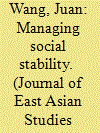| Srl | Item |
| 1 |
ID:
137205


|
|
|
|
|
| Summary/Abstract |
Based on a town government's meeting memos between March 2001 and October 2007, annual work reports, and my interviews with local officials, I show that China's township governments have strived to contain, rather than resolve, social discontent. The tendency toward containment lies in two fundamental features of China's political institutions and central government strategy. First, in order to optimize the function of the petition system as a source of information without losing control, the Hu Jintao administration (2002–2012) passed regulations protecting the rights of petitioners on the one hand, and simultaneously put pressure on local officials to discourage petitioning, on the other. Second, the technical, institutional, and political features of China's cadre evaluation system encouraged local officials to take a short-term perspective on challenges, avoiding penalties rather than actually solving problems.
|
|
|
|
|
|
|
|
|
|
|
|
|
|
|
|
| 2 |
ID:
186137


|
|
|
|
|
| Summary/Abstract |
Are evaluation targets negotiable in China’s cadre evaluation system? If so, which ones and how are they negotiated? Little empirical work answers these questions, which reveals the reconciliation of political control with local governance considerations in a centralized system. This article bridges the literature on bureaucratic bargaining with that on the target responsibility system by examining intra-governmental bargaining in the performance target-setting process. In-depth interviews reveal a “tournament“ logic of target-setting bargaining. Drawing on interviews and an original dataset of personnel rules, we conceptualize and classify performance targets based on their negotiability. The findings bring to light the presence of bargaining, albeit bounded, in the top-down rational-instrumental mechanism of the target responsibility system, and the intricate relationship between merit and personal connections in political selection.
|
|
|
|
|
|
|
|
|
|
|
|
|
|
|
|